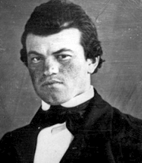 |
Missionaries from Gerlingen: Wilhelm Däuble | ||
|
Start • Sitemap | |||
|
No other family from Gerlingen gave more sons and daughters to the mission than the Däuble family. Father Jakob Däuble was born in Hasslach near Herrenberg and came in 1841 with eleven children as a school teacher to Gerlingen. Three of his sons became missionaries, two daughters missionary's wifes. |
Wilhelm
Däuble is born in 1824 in Sindelfingen as son of Jakob Däuble
and his wife Luise. The Däuble family moves to Gerlingen
in 1841.
Like his brother Gottlob Christoph he can visit for four to five years the secondary school and becomes an apprentice to printer master Wilhelm Frank in Stuttgart. Wilhelm gets registered in the Basel Mission in 1846. In 1851 he answers the question positive if he is "willed and ready" to let himself "overhand to the Bremen Mission", with the "estimated destination West Africa". The Bremen Mission, nowadays North German Mission, sends him to the area of Ghana which belongs to Togo then. Togo becomes later on from 1884 to 1918 German colony. |
||
|
Wilhelm Däuble gets send to Ewe country,
eastern from Volta river. Ewe is also the name of the natives' language.
Four missionaries had been sent already in 1847 to that area. All four had died. In 1851 new missionaries arrive in Peki, the main township of Ewe tribe. Among the missionaries are Wilhelm Däuble and a mission couple. A missionary dies soon, the couple leaves again, Däuble remains. He had come into an unsettled world: Soon there is war between the English and the inhabitants of Peki - because of the poll tax, which had caused also at the Gold Coast war and the defeat of the Krobo tribe. |

|
||
|
Däuble fights his way through to Accra and
after all he starts to build a house in Keta at the Atlantic Ocean, because the
war had destroyed everything. "Keta" means "sand head".
It's a sandbank with an earlier Danish fort on it, where before many slaves were
kept imprisoned..
Wilhelm Däuble and other missionaries start building a large, solid house which shall be used as a magazine. The walls from clay become half a meter thick. This very day such thick walls are called "German Walls" in West Africa. While working in blistering heat Wilhelm Däuble suffers from a sunstroke. He dies after three weeks, on the morning of Boxing Day in 1853, nine months after his brother Gottlob Christoph. |
|||
| Imprint | Contact: info@johannes-rebmann-stiftung.de | ||